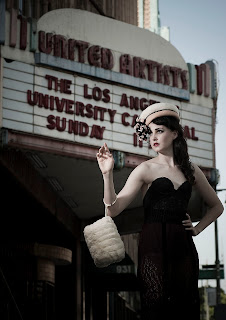 |
| Models: Dave Nelson and Brooke Boslem |

In 1996, my life changed dramatically when I took on the role of editor of a magazine I had proposed to a publishing company. It was known as PhotoMaster. It was also known as Better Pictures, which was the corporate version distributed by Camera House. From that moment on I was no longer a freelance gypsy with a camera. I suddenly became some kind of authority on photography. I was being asked to speak at camera clubs and societies, conventions and seminars. And then, I started running photography workshops. Since that time I have thoroughly enjoyed that role and I do not tire of it. Our recent Wedding Photography workshop was a prime example of that.
Creative Photo Workshops runs a variety of educational and enjoyable events. Most of the time, they are educational. Sometimes they are put together for a simultaneous combination of fun and learning. Case in point, our recent Film Noir workshops. Our Wedding Photography workshop has an entirely different potential however. Its very nature can alter the path of someone's secular life.
An overstatement? No. It is a workshop designed to teach ground level principles for overcoming some of the difficulties that the newcomer to wedding photography encounters. Most of those who attend are perfectly adept at taking the basics - family group photographs, candid images and even some lovely portraits and formals. However, for the photographer, a wedding is usually a case of producing extraordinary images in ordinary circumstances with everyday people. There are so models in $10, 000 dresses in ancient French castles here. Most weddings take place in suburbia, or in everyday situations. What we teach is the ability to create beautiful images - in camera - that impress on the day, and even more in the album once the finishing touches have been applied. Our workshops promote the idea of creating the image in camera - for two essential reasons. The camera is the primary capture tool and it can - believe it or not - create beautiful images all on its own. It is also a much more powerful business tool on location if the images you show your client as they are shot are already near perfect. Lightroom and PhotoShop are wonderful tools, and I love them both. However, they are there to enhance and create only those aspects of the digital image that cannot be created in camera. They should not exist for the photographer for the labour of constant and consistent repair.

The first part of the workshop happens all in the very room in which we hold our initial two hour lecture. Using basic window light, basic backdrops and basic metering techniques we prove that any location that has light can be used. Our customers left our workshop on the first day without having hardly left the room. And yet each of them was surprised with the images they themselves created. Using the camera manually, metering for the highlights and posing the subjects for the light are simple processes that have the power to transform the ordinary into the extraordinary.
Our second day is more complex. We began at the home of a friend who offered us a livingroom to prove that what we learned the day before works in most people's homes. Then, its off to various locations to find the light and put them in it. And, if the light is not what you want, we create it.
On and Off camera flash techniques were something that our customers asked us to explain and show from the outset. So, we did. Creating light when the light you want is not with you is a powerful addition to any photographer's toolbox. It has been the difference between mediocre and extraordinary at many of the weddings I have photographed, and the images that result in camera are enough to convince any dubious couple of your abilities or the images you are producing. After that, they are putty in your hands, willing models who are suddenly getting all funky for ya.
Our customers leave the workshop with skills that enable them to see light, meter for it and create images at their weddings - weddings that happen in our own surroundings. We want the couples who don't look like Brad and Angelina and who don't hold their receptions in ancient castles or mansions to still have the most beautiful images possible. That honours our process and our place as photographers. It also honours their wedding day and their love for each other.




























